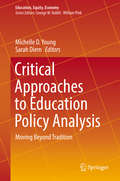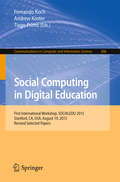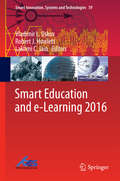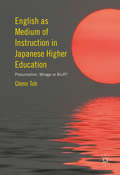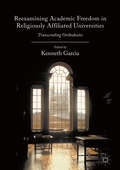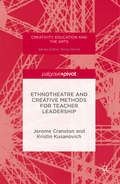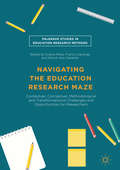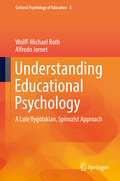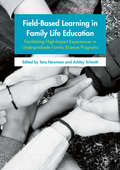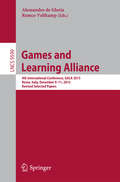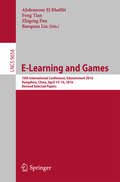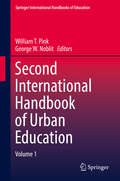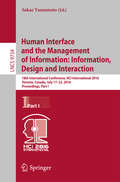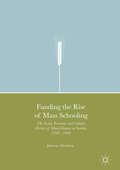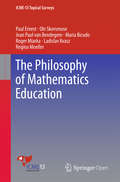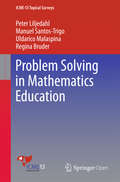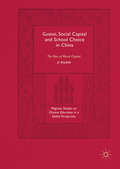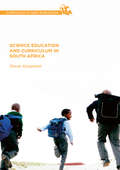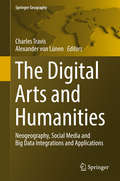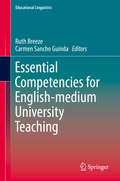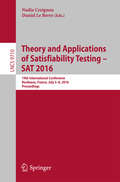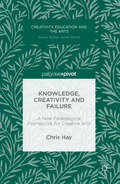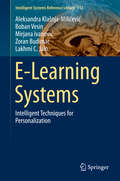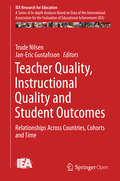- Table View
- List View
Critical Approaches to Education Policy Analysis: Moving Beyond Tradition (Education, Equity, Economy #4)
by Michelle D. Young Sarah DiemThis volume informs the growing number of educational policy scholars on the use of critical theoretical frameworks in their analyses. It offers insights on which theories are appropriate within the area of critical educational policy research and how theory and method interact and are applied in critical policy analyses. Highlighting how different critical theoretical frameworks are used in educational policy research to reshape and redefine the way scholars approach the field, the volume offers work by emerging and senior scholars in the field of educational policy who apply critical frameworks to their research. The chapters examine a wide range of current educational policy topics through different critical theoretical lenses, including critical race theory, critical discourse analysis, postmodernism, feminist poststructuralism, critical theories related to LGBTQ issues, and advocacy approaches.
Social Computing in Digital Education
by Fernando Koch Andrew Koster Tiago PrimoThis book constitutes the refereed proceedings of the First International Workshop, SOCIALEDU 2015, held in Stanford, CA, USA, in August 2015. The workshop aimed to discuss computational models of social computing applied to Digital Education. The 9 revised full papers presented were carefully reviewed and selected from 12 submissions. The papers address issues such as novel data mining and machine learning for social intelligence in digital education. - Social modelling and simulation to investigate social behaviours, emotional intelligence, influence processes and other social aspects that may influence learning performance in an educational environment. - Smart environments and interactive systems of social computing in digital education. - Analysis of social media and media intelligence in digital education. - Mobile social gaming in digital education. - The utilization of mobile and wearable technology in social systems in digital education, and others.
Smart Education and e-Learning 2016
by Lakhmi C. Jain Robert J. Howlett Vladimir L. UskovThis book contains the contributions presented at the 3rd international KES conference on Smart Education and Smart e-Learning, which took place in Puerto de la Cruz, Tenerife, Spain, June 15-17, 2016. It contains a total of 56 peer-reviewed book chapters that are grouped into several parts: Part 1 - Smart University: Conceptual Modeling, Part 2 - Smart Education: Research and Case Studies, Part 3 - Smart e-Learning, Part 4 - Smart Education: Software and Hardware Systems, and Part 5 - Smart Technology as a Resource to Improve Education and Professional Training. We believe that the book will serve as a useful source of research data and valuable information for faculty, scholars, Ph. D. students, administrators, and practitioners - those who are interested in innovative areas of smart education and smart e-learning.
English as Medium of Instruction in Japanese Higher Education
by Glenn TohThis book sets out to uncover and discuss the curricular, pedagogical as well as cultural-political issues relating to ideological contradictions inherent in the adoption of English as medium of instruction in Japanese education. Situating the Japanese adoption of EMI in contradicting discourses of outward globalization and inward Japaneseness, the book critiques the current trend, in which EMI merely serves as an ornamental and promotional function rather than a robust educational intervention.
Reexamining Academic Freedom in Religiously Affiliated Universities
by Kenneth GarciaKenneth Garcia presents an edited collection of papers from the 2015 conference on academic freedom at religiously affiliated universities, held at the University of Notre Dame. These essays reexamine the secular principle of academic freedom and discuss how a theological understanding might build on and further develop it. The year 2015 marked the 100th anniversary of the founding of the American Association of University Professors (AAUP), the leading advocate of academic freedom in America. In October 2015, the University of Notre Dame convened a group of prominent scholars to consider how the concept and practice of academic freedom might evolve. The premise behind the conference was that the current conventional understandings of academic freedom are primarily secular and, therefore, not yet complete. The goal was to consider alternative understandings in light of theological insight. Theological insight, in this context, refers to an awareness that there is a surplus of knowledge and meaning to reality that transcends what can be known through ordinary disciplinary methods of inquiry, especially those that are quantitative or empirical. Essays in this volume discuss how, in light of the fact that findings in many fields hint at connections to a greater whole, scholars in any academic field should be free to pursue those connections. Moreover, there are religious traditions that can help inform those connections.
Ethnotheatre and Creative Methods for Teacher Leadership
by Jerome Cranston Kristin KusanovichThis book addresses the lived challenges to teacher leadership. It illustrates an arts-based research approach that effectively highlights the broader context of relational dynamics between adults at school, using one-act plays to open up difficult conversations on complex issues. School leadership has, ostensibly, a performative dimension. Teacher leaders enact leadership from a more vulnerable platform than those with administrative positions, while they try to thrive in roles which are not always clear from their pre-service preparation. Early-career teachers are often not aware of the very real hazards that can accompany their initial foray into leadership. This book encourages creative thinking about how to enact the teacher role to better embed and advocate for a supportive and just system.
Navigating the Education Research Maze
by Patrick Alan Danaher Dolene Rossi Francis GacengaThis book depicts rigorous and vigorous accounts of strategies used successfully by researchers to negotiate their way through the research maze. The metaphor of the maze evokes several different and sometimes contradictory elements of contemporary education research, including complexity, confusion, messiness, multiplicity and risk. While these are not necessarily or wholly negative attributes, it is important for researchers to be able to articulate and implement effective strategies for engaging wholeheartedly with these situations to navigate the education research maze. The book is structured around three main themes; politics, ethics, philosophies and theories of education research mazes; mazes in and with specific research methods; and mazes in and with specific research tasks and technologies. Each account develops broader lessons for enhancing the impact, quality, relevance and significance of research in other disciplines as well as education.
Understanding Educational Psychology
by Wolff-Michael Roth Alfredo JornetThis book takes up the agenda of the late (but unknown) L. S. Vygotsky, who had turned to the philosopher Spinoza to develop a holistic approach to psychology, an approach that no longer dichotomized the body and mind, intellect and affect, or the individual and the social. In this approach, there is only one substance, which manifests itself in different ways in the thinking body, including as biology and culture. The manifestation as culture is premised on the existence of the social. In much of current educational psychology, there are unresolved contradictions that have their origin in the opposition between body and mind, individual and collective, and structure and process--including the different nature of intellect and affect or the difference between knowledge and its application. Many of the same contradictions are repeated in constructivist approaches, which do not overcome dichotomies but rather acerbate them by individualizing and intellectualizing our knowledgeable participation in recognizably exhibiting and producing the everyday cultural world. Interestingly enough, L. S. Vygotsky, who is often used as a referent for making arguments about inter- and intrasubjective "mental" "constructions," developed, towards the end of his life, a Spinozist approach according to which there is only one substance. This one substance manifests itself in two radically different ways: body (material, biology) and mind (society, culture). But there are not two substances that are combined into a unit; there is only one substance. Once such an approach is adopted, the classical question of cognitive scientists about how symbols are grounded in the world comes to be recognized as an artefact of the theory. Drawing on empirical materials from different learning settings--including parent-child, school, and workplace settings--this book explores the opportunities and implications that this non-dualist approach has for educational research and practice.
Field-Based Learning in Family Life Education
by Tara Newman Ashley SchmittThis book provides successful models for field-based learning experiences in Family Life Education. Each chapter provides an overview of the implementation details, including key points that others developing a plan could use to guide their thinking. Each chapter is grounded in previous scholarship and identifies how the elements of high-impact practices are addressed in the "real world". Contributors share their experiences implementing service learning, internships, and other educational platforms outside the classroom walls. This book also addresses both specific content areas within family life education, as well as general course management strategies.
Games and Learning Alliance
by Remco Veltkamp Alessandro De GloriaThis book constitutes the refereed proceedings of the 4th International Conference on Games and Learning Alliance, GALA 2015, held in Rome, Italy, in December 2015. The 33 revised full papers and 15 short papers presented were carefully reviewed and selected from 102 submissions. The papers presented cover a variety of aspects and knowledge fields. They are grouped around the following topics: games for health, games for mobility, pervasive gaming and urban mobility.
E-Learning and Games
by Feng Tian Zhigeng Pan Abdennour El Rhalibi Baoquan LiuThis book constitutes the refereed proceedings of the 10th International Conference on E-Learning and Games, Edutainment 2016, held in Hangzhou, China, in April 2016. The 36 full papers presented were carefully reviewed and selected from 60 submissions. They are organized in the following topical sections: E-learning and game; graphics, imaging and applications; intelligent data analytics and visualization.
Second International Handbook of Urban Education
by George W. Noblit William T. PinkThis second handbook offers all new content in which readers will find a thoughtful and measured interrogation of significant contemporary thinking and practice in urban education. Each chapter reflects contemporary cutting-edge issues in urban education as defined by their local context. One important theme that runs throughout this handbook is how urban is defined, and under what conditions the marginalized are served by the schools they attend. Schooling continues to hold a special place both as a means to achieve social mobility and as a mechanism for supporting the economy of nations. This second handbook focuses on factors such as social stratification, segmentation, segregation, racialization, urbanization, class formation and maintenance, and patriarchy. The central concern is to explore how equity plays out for those traditionally marginalized in urban schools in different locations around the globe. Researchers will find an analysis framework that will make the current practice and outcomes of urban education, and their alternatives, more transparent, and in turn this will lead to solutions that can help improve the life-options for students historically underserved by urban schools.
Human Interface and the Management of Information: 18th International Conference, HCI International 2016 Toronto, Canada, July 17-22, 2016, Proceedings, Part I (Lecture Notes in Computer Science #9734)
by Sakae YamamotoThe two-volume set LNCS 9734 and 9735 constitutes the refereed proceedings of the Human Interface and the Management of Information thematic track, held as part of the 18th International Conference on Human-Computer Interaction, HCII 2016, held in Toronto, Canada, in July 2016. HCII 2016 received a total of 4354 submissions of which 1287 papers were accepted for publication after a careful reviewing process. These papers address the latest research and development efforts and highlight the human aspects of design and use of computing systems. The papers accepted for presentation thoroughly cover the entire field of human-computer interaction, addressing major advances in knowledge and effective use of computers in a variety of application areas This volume contains papers addressing the following major topics: information presentation; big data visualization; information analytics; discovery and exploration; interaction design, human-centered design; haptic, tactile and multimodal interaction.
Funding the Rise of Mass Schooling
by Johannes WestbergThis book presents expert analysis on how the remarkable rise of mass schooling was funded during the nineteenth century. Based on rich source materials from rural Swedish school districts, and drawing up evidence from schooling in countries including France, Germany, England and the U. S. , Westberg examines the moral considerations that guided economic practices and sheds new light on how the advent of schooling did not only rest upon monies, but also on grains, firewood and cow fodder. Exploring school districts' motives and economic culture, this book shows how schooling was neither primarily guided by frugal impulses nor motivated by a fear of the growing working classes. Instead, school spending served multiple purposes in school districts that pursued a fair and reasonable economic practice. In addition to being a highly-detailed case study of Sweden 1840 - 1900 this book also entails a broadening of the theoretical horizon of history of education into social, agrarian and economic history in a wider context. With a focus on different systems of school finance, this work reveals a key change over time: from a largely in-kind system supporting schools in an early phase, followed by an increasingly monetarized, depersonalized and homogenized system of school finance. Boasting an interdisciplinary appeal, this will be a welcome contribution of interest to scholars in the fields of education history, sociology, and economics.
The Philosophy of Mathematics Education
by Paul Ernest Ole Skovsmose Jean Paul van Bendegem Maria Bicudo Roger Miarka Ladislav Kvasz Regina MoellerAlthough many agree that all teaching rests on a theory of knowledge, there has been no in-depth exploration of the implications of the philosophy of mathematics for education. This is Paul Ernest's aim. Building on the work of Lakatos and Wittgenstein it challenges the prevalent notion that mathematical knowledge is certain, absolute and neutral, and offers instead an account of mathematics as a social construction. This has profound educational implications for social issues, including gender, race and multiculturalism; for pedagogy, including investigations and problem solving; and challenges hierarchical views of mathematics, learning and ability. Beyond this, the book offers a well-grounded model of five educational ideologies, each with its own epistemology, values, aims and social group of adherents. An analysis of the impact of these groups on the National Curriculum results in a powerful critique, revealing the questionable assumptions, values and interests upon which it rests. The book finishes on an optimistic note, arguing that pedagogy, left unspecified by the National Curriculum, is the way to achieve the radical aims of educating confident problem posers and solvers who are able to critically evaluate the social uses of mathematics.
Problem Solving in Mathematics Education
by Peter Liljedahl Regina Bruder Manuel Santos-Trigo Uldarico MalaspinaThis survey book reviews four interrelated areas: (i) the relevance of heuristics in problem-solving approaches why they are important and what research tells us about their use; (ii) the need to characterize and foster creative problem-solving approaches what type of heuristics helps learners devise and practice creative solutions; (iii) the importance that learners formulate and pursue their own problems; and iv) the role played by the use of both multiple-purpose and ad hoc mathematical action types of technologies in problem-solving contexts what ways of reasoning learners construct when they rely on the use of digital technologies, and how technology and technology approaches can be reconciled. "
Guanxi, Social Capital and School Choice in China
by Ji RuanThis book focuses on the use of guanxi (Chinese personal connections) in everyday urban life: in particular, how and why people develop different types of social capital in their guanxi networks and the role of guanxi in school choice. Guanxi takes on a special significance in Chinese societies, and is widely-discussed and intensely-studied phenomenon today. In recent years in China, the phenomenon of parents using guanxi to acquire school places for their children has been frequently reported by the media, against the background of the Chinese Communist Party's crackdown on corruption. From a sociological perspective, this book reveals how and why parents manage to do so. Ritual capital refers to an individual's ability to use ritual to benefit and gain resources from guanxi.
Guanxi, Social Capital and School Choice in China: The Rise of Ritual Capital (Palgrave Studies on Chinese Education in a Global Perspective)
by Ji RuanThis book focuses on the use of guanxi (Chinese personal connections) in everyday urban life: in particular, how and why people develop different types of social capital in their guanxi networks and the role of guanxi in school choice. Guanxi takes on a special significance in Chinese societies, and is widely-discussed and intensely-studied phenomenon today. In recent years in China, the phenomenon of parents using guanxi to acquire school places for their children has been frequently reported by the media, against the background of the Chinese Communist Party’s crackdown on corruption. From a sociological perspective, this book reveals how and why parents manage to do so. Ritual capital refers to an individual's ability to use ritual to benefit and gain resources from guanxi.
Science Education and Curriculum in South Africa
by Oscar KoopmanThis book explores the impact of the socio-historical, political, and economic environment in South Africa, both during and after Apartheid. During this time, the South African education system demonstrated an interest in a specific type of knowledge, which Koopman refers to as 'a science of government'. This 'science of government' leaves the learners with a blurred understanding of science that is disconnected from external nature and human nature, and is presented as a series of abstract concepts and definitions. The book also investigates the dialectical tensions between the science curriculum and the role of the teacher as an active implementer of the curriculum. The book draws on the work of various phenomenological scholars, namely Edmund Husserl, Martin Heidegger, Merleau-Ponty, and Max van Manen to discuss these tensions.
The Digital Arts and Humanities
by Alexander Von Lünen Charles TravisThe case studies in this book illuminate how arts and humanities tropes can aid in contextualizing Digital Arts and Humanities, Neogeographic and Social Media activity and data through the creation interpretive schemas to study interactions between visualizations, language, human behaviour, time and place.
Essential Competencies for English-medium University Teaching
by Carmen Sancho Guinda Ruth BreezeAs English gains prominence as the language of higher education across the world, many institutions and lecturers are becoming increasingly concerned with the implications of this trend for the quality of university teaching and learning. With an innovative approach in both theme and scope, this book addresses four major competencies that are essential to ensure the effectiveness of English-medium higher education: creativity, critical thinking, autonomy and motivation. It offers an integrated perspective, both theoretical and practical, which defines these competences from different angles within ELT and Applied Linguistics, while also exploring their points of contact and applications to classroom routines. This approach is intended to provide practical guidance and inspiration, in the form of pedagogical proposals, examples of teaching practice and cutting-edge research by scholars and university teachers from all over the world. To that end, a leading specialist in the field introduces each of the four competencies, explaining concepts accessibly and synthetically, exposing false myths, presenting an updated state of the art, and opening windows for future studies. These introductions are followed by practitioner chapters written by teachers and scholars from different cultures and university contexts, who reflect on their experience and/or research and share effective procedures and suggestions for the university class with English as a vehicle for instruction.
Theory and Applications of Satisfiability Testing - SAT 2016
by Nadia Creignou Daniel Le BerreThis book constitutes the refereed proceedings of the 19th International Conference on Theory and Applications of Satisfiability Testing, SAT 2016, held in Bordeaux, France, in July 2016. The 31 regular papers, 5 tool papers presented together with 3 invited talks were carefully reviewed and selected from 70 submissions. The papers address different aspects of SAT, including complexity, satisfiability solving, satisfiability applications, satisfiability modulop theory, beyond SAT, quantified Boolean formula, and dependency QBF.
Knowledge, Creativity and Failure
by Chris HayThis book offers a new framework for the analysis of teaching and learning in the creative arts. It provides teachers with a vocabulary to describe what they teach and how they do this within the creative arts. Teaching and learning in this field, with its focus on the personal characteristics of the student and its insistence on intangible qualities like talent and creativity, has long resisted traditional models of pedagogy. In the brave new world of high-stakes assessment and examination-driven outcomes across the education system, this resistance has proven to be a severe weakness and driven creative arts teachers further into the margins. Instead of accepting this relegation teachers of creative arts must set out to capture the distinctiveness of their pedagogy. This book will allow teachers to transcend the opaque metaphors that proliferate in the creative arts, and instead to argue for the robustness and rigour of their practice.
E-Learning Systems
by Lakhmi C. Jain Mirjana Ivanović Aleksandra Klašnja-Milićević Boban Vesin Zoran BudimacThis monograph provides a comprehensive research review of intelligent techniques for personalisation of e-learning systems. Special emphasis is given to intelligent tutoring systems as a particular class of e-learning systems, which support and improve the learning and teaching of domain-specific knowledge. A new approach to perform effective personalization based on Semantic web technologies achieved in a tutoring system is presented. This approach incorporates a recommender system based on collaborative tagging techniques that adapts to the interests and level of students' knowledge. These innovations are important contributions of this monograph. Theoretical models and techniques are illustrated on a real personalised tutoring system for teaching Java programming language. The monograph is directed to, students and researchers interested in the e-learning and personalization techniques.
Teacher Quality, Instructional Quality and Student Outcomes
by Trude Nilsen Jan-Eric GustafssonThis volume offers insights from modeling relations between teacher quality, instructional quality and student outcomes in mathematics across countries. The relations explored take the educational context, such as school climate, into account. The International Association for the Evaluation of Educational Achievement's Trends in Mathematics and Science Study (TIMSS) is the only international large-scale study possessing a design framework that enables investigation of relations between teachers, their teaching, and student outcomes in mathematics. TIMSS provides both student achievement data and contextual background data from schools, teachers, students and parents, for over 60 countries. This book makes a major contribution to the field of educational effectiveness, especially teaching effectiveness, where cross-cultural comparisons are scarce. For readers interested in teacher quality, instructional quality, and student achievement and motivation in mathematics, the comparisons across cultures, grades, and time are insightful and thought-provoking. For readers interested in methodology, the advanced analytical methods, combined with application of methods new to educational research, illustrate interesting novel directions in methodology and the secondary analysis of international large-scale assessment (ILSA).
